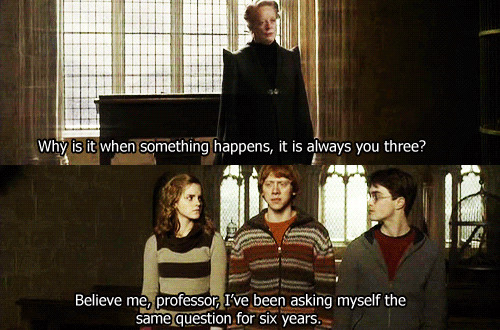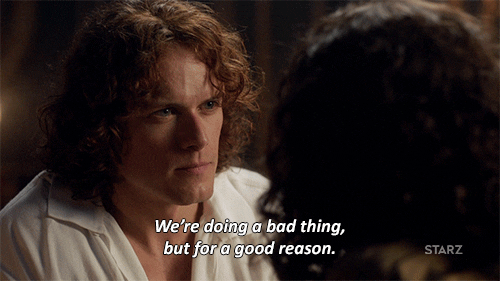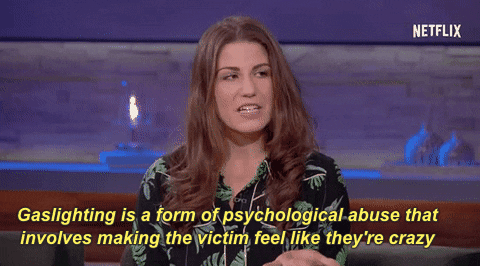|
BY MARYBETH GRONEK It’s the little foxes that spoil the garden. It’s the little stains that ruin the outfit. It’s the little shards of glass that, when stepped on, prove the trickiest and most painful to extract. Truth is, most dangerous people we meet aren’t serial killers. They are your average Joes (sorry to all the people named Joe out there) who *seem* okay for a while, then come at you with such cruelty that you’re like who the heck is this, and how did I not see this before? If we’re being real honest, though, there were things. Little things. Little things here and there that didn’t quite sit right. A weird look. A bizarre response to something someone else said. A visceral feeling to not disclose completely. Little subtleties that (should have) clued us in that something’s not quite right. That trouble is ahead. And then sh*t hits the fan and our subconscious is like Yep. Saw that coming a yardstick away. Because not every foe comes at us with a pitchfork. Because real danger is an iceberg; barely visible on the horizon, the true horror buried much deeper. Because we can’t see a wolf’s teeth until it growls. But we can notice the scowl. That’s what this article is about: identifying the *low-key* signs that someone is dangerous. Not murderous dangerous. Just the type that will steal your joy, throw shade your impact, & minimize your legacy. You know, the things that really matter. 1. They are tenacious about maintaining appearances. They are hyper-conscious of how they appear to others and actively work to control your perception of them. Whether it’s wanting to appear smart or strong or capable or ‘edgy,’ such people protect their image at all costs and view everything you say and do through the lens of does this threaten or uphold my image? This person will seem really normal and then fly off the handle all of a sudden to a seemingly innocent comment from a friendly source that was mistaken as a threat. For such an individual, nothing is ‘neutral’ — everything either supports or attacks the image of themselves they’ve constructed. It’s called narcissism in its extreme form (or megalomania when it’s most intense), but, honestly, most cases are less severe. And are perpetrated by people who, generally, care about others but don’t know how to go about maintaining relationship when they feel threatened. Which is often. 2. They have unresolved issues. You’ve heard the phrase: hurt people hurt people. When someone experiences pain and hasn’t sufficiently dealt with it or healed from it, you can bet they are dangerous. Much like the ‘appearances’ person, they seem normal until you unknowingly touch upon their unresolved issue. Unresolved issues manifest in different ways. It could be an overcritical, berating father whose son grows up to never be proud of himself or his work. So when you innocently remind him of something he has to do for you, he flies off the handle, not having resolved the issue of feeling inadequate. Or maybe the woman who was cheated on by a previous partner who can’t seem to trust any man— at work or in her love life — since. And when a male colleague or person she’s dating innocently omits key information she rails into him. Fearful, of course, that he’s being dishonest. Like the ‘appearances’ person, the ‘unresolved issues’ person reacts to every encounter through the lens of their pain. And thus, their behavior is erratic — normal in most circumstances, but completely irrational when intersecting with the unhealed wound. 3. They are a drama magnet. This is the person who seems to always be connected with relational drama. They cause repeated strife in the friend group, they’ve been ostracized from their family (by choice), they’ve “had to” cut out people from their life. Each of these in isolation may be justified and maybe isn’t so bad. The drama magnet, though, will have an ‘all of the above’ approach— a long history of stirring the relational pot. Boil down any controversy and you will find them at the center. Talk about a resume builder! Unlike Harry, Ron, and Hermione though, the drama magnet is not as self-aware and doesn’t realize that they are the epicenter of relational strife. I once had a friend like this. She would talk about people behind their back repeatedly. She cut herself off from her biological family. She caused drama at her church, to the point where she physically had to leave the state. She even ruined a budding romance of mine by poisoning the man’s opinion of me. Really gross stuff. Every place she traversed she left a path of destruction in her wake. Such people are dangerous because they are a ticking bomb: it’s only a matter of time before you are next. 4. They choose to air grievances publicly, not privately. Utilized by the insecure in physical venues and the cowardly in virtual spaces, public confrontation may seem like the *ultimate* power move. It’s celebrated in movies, TV shows, and other cultural benchmarks. The bowl in the china shop. The one who is “not afraid” to make waves. Real Housewives style. The truth is: they’re scared. Scared to share what is actually bothering them. Scared of being vulnerable. Scared of not getting what they want. Scared to be on the receiving end of your disappointment. And unable to bear its weight. So they put on a spectacle. Because then they only have to deal with your shock, not the substance of your concerns. A wise person once told me — praise publicly, critique privately. Why do we have so much trouble following this adage that we know, implicitly, is the honorable way? Because it’s easier to critique publicly. Private confrontation involves dialogue. A back and forth. Understanding, concessions, and oftentimes, meeting in the middle. And acknowledging that maybe I’m a bit in the wrong too. Critiquing privately involves introspection and personal growth. Essentially, it requires work from both parties .The painful, yet good kind of work. Dangerous people run from this at all costs. Their energy is spent elsewhere — preventing their ego from meeting their true self. Self-reflection cannot be permitted. So the environment that engenders such reflections (dialogue) must also be avoided. Dangerous people don’t talk through, they act out. You know what takes courage? Looking into someone’s eyes, one-on-one, and actually telling them how they missed the mark. If everyone out there actually did this, I believe we could heal our relationships. Heck, we could heal our land. 5. They have patterns of deception. And corresponding justification.There is no trait more universally bemoaned than deception. It is the scourge of every world that contains it and the downfall of every character that embraces it. Want proof? Look no further than our collective canon of literary examples. Satan was called “the great deceiver.” Judas Iscariot traded his friend for 30 silver pieces. From Othello’s Iago to Hamlet’s Claudius, Shakespeare villians share deception as their one linking ethos. Fast-forward a few hundred years. Scar deceived Mufasa. Peter Pettigrew deceived the Potters. Loki deceived all of Asgard (over and over again). The list is endless. When it comes to character constitution, there is no trait more corrupting and degrading. Or, as Marcellus puts it after seeing the ghost of Hamlet’s father, Something is rotten in the state of Denmark. Not every deception, though, is as deadly obvious as a Shakespeare play. And in 21st century life, it usually pairs with a hearty side of justification. I dated a guy a few years ago who was recently divorced. He treated me well and I thought he really treasured me. A few months in, I found out he had filed for divorce but it wasn’t actually finalized yet. He conveniently left out that detail. Of course he justified this oversight by his fear of losing me should I know the truth. Regardless of his reason, I couldn’t sugar-coat it — he intentionally deceived me. And then he tried to justify his deception. I started playing back our conversations and began seeing justifications everywhere, even for things I didn’t accuse him of. It made me doubt…pretty much everything. This deception-justification pattern is a common behavior of the dangerous. Why? Because like the drama magnet, it’s only a matter of time before you are the deceived party. And when that time comes, you won’t get a heartfelt apology. You’ll get a cold, hard, chilling, justification. No inkling of remorse, no desire to change on their part. To stay, at that juncture, would mean willingly agreeing to be duped in the future. And no self-respecting person can do that. To befriend a known deceiver is to agree to a fruitless relationship that is bound to end. Might as well start preparing the eulogy. 6. They refuse to take responsibility. “We’ve gotten to the point where everybody’s got a right and nobody’s got a responsibility.” Newton Minow, former FCC Chair A subtly dangerous person will refuse to take responsibility. For their own actions. For how those actions impacted you. For anything, for that matter. They are incorrigible — in the worst possible way. They cannot be prevailed upon to assume any sort of negative responsibility, perceived or otherwise. Any problem, should it exist in the world, is someone else’s fault. Do a quick scan of those in your relational web. Can you find someone who, to your recollection, has a habit of not taking responsibility for their actions? If so, stay far away. Chances are they are dangerous & you (luckily) have not had the occasion to find out. For the record, I think Lorelei Gilmore is delightful and not at all dangerous! ;) 7. They force you to doubt reality. Doubt is their name and gaslight is their game. This is when the person moves out of the *subtly* dangerous category and into the *overtly* dangerous category. They try to convince you something happened that didn’t. Or, more likely, they try to convince that you that something that did happen actually didn’t. Like their poor behavior (that you point out) or not fulfilling their word (which you call them on). Instead of making excuses or justification, which is insulting enough, they have the audacity to tell you you are not remembering things correctly. Sound familiar? Stephanie Sarkis, Ph.D. has done terrific work outlining other characteristics of gaslighters that really hits the mark. Gaslighting is a natural outgrowth of justification (#5) and not taking responsibility (#6). Instead of providing rationale or blaming someone else, the gaslighter just asserts ‘no you’re remembering it wrong, that’s not how it was.’ It involves a level of self-deception that is quite flabbergasting. And it violates trust between two people, which is the bedrock of a healthy relationship. If someone is trying to get you to doubt reality — RUN. I don’t think a dangerous person has to meet all of the above criteria. Heck, I don’t even think someone has to exhibit a natural progression of terrible behavior. Relationships aren’t that neat and tidy. Just one or two of these signs should raise alarm bells in your psyche. At the end of the day, it’s up to you to acknowledge these psychological “alarms” and determine what your next course of action is. Namely, if you will maintain or break rapport. Either way you win because you are now in control! The likelihood of getting caught off guard by dangerous behavior will be minimized. You are now equipped with the warning signs.
Why does this all matter? Because life is too short to spend it with toxic people. Maybe it’s just me, but ever since I hit my thirties my BS threshold has gone way up. I love my life and have no time or mental energy to waste on people who don’t deserve that investment. These signs help differentiate the healthy from seemingly-healthy. They prevent investing in someone who who won’t be in my life long-term. And they provide a sense of confidence and security that those in my inner circle can be trusted. Really trusted. So here’s to meaningful living. To enduring relationships. And to spotting the scowl before the growl. 😉
10 Comments
BY JENNY B “I did what I did, to save our friendship.”
“I met up with the guys last night and talked about if I should even tell you what happened…” “I don’t talk about what it’s like at work, because it would probably only scare or worry you.” These were the preamble to some of the worst conversations I’ve ever had. Regardless of the heavy content, the person delivering the news had attempted to script both sides of the conversation. In a gross overreach in preparing for a difficult conversation, it seemed as though each of these significant people in my life had over rehearsed the questions or lines of dialogue they imagined would follow. They had numbed themselves to being able to listen or remain curious about my actual reaction in the moment. In the worst case scenarios, they tried to explain how they had already taken action based on ‘how well they knew me’ and ‘what was best.’ Now, I don’t know about you. But, I would prefer to be approached as an equal partner in decisions affecting my life. Where that is not possible or ‘the ship has already sailed’, at least come to deliver the news, regarding me as a worthy adversary against adversity. I bring this up in sincere reflection about dialoguing with another person versus self-talk. In so many instances, our discussions with others, especially important relationships in our lives, feed into the content of our self-talk and vice versa. However, even at their most heated and intense, these are not the same. Even while sorting out your own rich and complex self-talk, you must remain curious about the other person. Even if you anticipate what you might be triggering in their self-talk and your shared history of the relationship, bottom line is: You don’t get to own both sides of the conversation. A graduate student on the path to become a professor or academic once told me he was taking an improv class, for fun. Picture ‘Whose Line is it anyway?’ or ‘Second City’. He said the best lesson was that even if you had thought of the perfect thing to say or do, you can’t get too hung up on it if other actors have jumped in and the moment to share it has passed. It comes across as you looking frozen and stilted while everyone else is acting and connecting ‘Live’. It doesn’t matter if what you had planned to say or do was brilliant, if it is out of synch when you say or do it. Many of us prepare for difficult conversations, out of respect for the other person(s) who will be involved. Sometimes, wrestling with our own questions or the fear of triggering strong emotion causes us to rehearse what might be said. Don’t let your preconceived notions and self-talk overtalk the worthiness of the person and moment in front of you. Do the ‘Live’ show. BY MARYBETH GRONEK So, it’s over.
It’s been over (perhaps) for a while. And you’re wondering am I actually over them? I’ve read a lot of advice on this topic — how to know whether you’re over your ex. Most of it recommends readers to look out for the following indicators:
The above advice misses the mark. In my own personal experience, I’ve found the five below indicators the most telling when answering the question am I over my ex? #1 — You Forgot They Existed. I’m a big Taylor Swift junkie. When her Lover album came out in 2019, the first track, I Forgot That You Existed was on repeat in my car. Not just because it’s a catchy tune (it is), but because it conveyed a state of mind I so desperately sought but hadn’t quite obtained. “I forgot that you Sent me a clear message Taught me some hard lessons I just forget what they were It’s all just a blur” To remember my ex briefly and say, wow I totally forgot about them. That was the state of mind I wanted to achieve. Interestingly, it’s not something that can be sped up or changed by sheer volition, though. It comes about gradually. When you’re still hung up on someone, you speak about them often and you think about them often. Or, as T. Swift says in her song: “Your name on my lips, tongue tied Free rent, livin’ in my mind” When your ex no longer lives “rent-free” in your mind, you know that you are over them. When you get to the point where weeks, even months pass before you think about them (and not because your mind “sought” them out, but because something in passing reminded you of them), you can rest assured you’re finally over them. #2 — The Thought of Intimacy (With Them) Is Repulsive. The desire of being with them is no longer present. It’s not interesting. Or alluring. It’s actually yucky. You don’t want to kiss them. Or sleep with them. You don’t want them having any part of your body. Not openly or secretly. Just, nope. Hard pass. #3— You’re Indifferent. The feelings of hatred, anger, or shame are no longer present. You genuinely want the best for your ex. “I forgot that you existed It isn’t love, it isn’t hate It’s just indifference” When you’re mad or want them to pay for what they’ve done, it reveals that you still care. Indifference is the emotion you’re after. Don’t misunderstand me — it’s not like you can ‘will’ yourself into indifference. And you can’t fake it either. True indifference is genuine. And it is a sure sign you are over your ex. #4 — Encountering Them Isn’t Anxiety-Producing. We all do this. We wonder what it would be like to serendipitously ‘bump into’ our ex. This fantasy occurs quite regularly in the early stages of a breakup. With it comes conflicting, deep-seated desires — the desire to show them you’re okay, or to show them how much they’ve hurt you, or, to prove to them that you’ve moved on (often accompanied by your new revenge body 😉). This fantasy, at its root, reveals a desire to communicate something in a space where communication has been severed. Whatever your message is though, the thought of actually encountering your ex brings anxiety. You want to convey the right ‘message’ and you’re unsure you will. Thus, the thought of ‘bumping into’ your ex does not satisfy or settle you, it leads to feelings of dread and trepidation. When you’re truly over someone, the thought of seeing them brings peace. You have nothing left to communicate. You have nothing left to ‘prove.’ Since there are zero expectations on the encounter, there is nothing to be anxious about. You are relaxed. This mental calm and security at the possibility of seeing your ex again is one of the strongest indicators that you have, indeed, moved on. #5 — You Don’t Recognize The Person You Were With Them. On a superficial level, new things are (and have been) happening in your life.
On a deeper level though, you’ve become a different person. You’ve changed and grown so much, that to think of who you were with your ex honestly makes you cringe. You laugh at the garbage the “old” you was willing to put up with. You rejoice at how far you’ve come. And you expectantly embrace the future, catching and treasuring all of it’s wonderful possibilities like fireflies on a warm summer night. There’s something more, though. Something about being ‘over’ someone that can’t be quantified. A visceral feeling, deep deep down. The truth? If you’re wondering if you’re over your ex, you probably aren’t. It’s something you just know. You either read this article bracing for the worst, knowing on some subconscious level that you’re still not over him/her; or embracing the best, joyfully celebrating what you knew all along. You’re free. And it feels good. Calming, good. Or as T. Swift would say: “And it was so nice So peaceful and quiet” ❤️❤️❤️❤️❤️ BY MARYBETH GRONEK People-pleasing behavior amounts, essentially, to behaving like a doormat. It’s never saying ‘no.’ It’s wanting to be liked more than wanting to be respected. It’s not having a spine. It’s bowing to others’ opinions at the expense of our dreams. Psychologists and therapists have done a great job identifying the signs of people-pleasing. That’s not what this article is about. This article is about how I’ve learned to acquire freedom from this destructive tendency. To do this, I’ve had to understand that people-pleasing is crippling, but not as destructive as the thing it is masking —namely, selfishness and fantasy-building. For most of my adult life I’ve struggled with people-pleasing. ‘Struggled’ is quite soft, actually. It’d be more apt to say that, up until a few years ago, I’ve been afflicted with it. Like a chronic disease, ever ravenous, daily eating away at my hopes, dreams, and potential. Self-sabotage party of one, please. And I’ve gone through various stages of trying to eradicate it from my life. If you are likewise afflicted, you might spot yourself in some of these commonly-used, yet failed tactics in the Abort People-Pleasing Campaign:
The problem is, from an objective standpoint, none of these tactics actually work. They don’t achieve their end goal: freedom from people-pleasing. The above strategies fail, as does the whole conversation regarding “people-pleasing,” because the focus is on the wrong object: other people. Of course we are losing the war — we have misidentified our enemy. We attempted to correct self while our gaze remained on others. This is a broken framework, doomed to fail, because people-pleasing is a symptom not a cause. As long as the strategy is to solve the symptom, recovery will be perpetually out of reach. Instead we must look to confront the root cause — ourselves. Here’s how I’ve learned how to do that in my life. Selfishness
The moment I identified these root causes of people-pleasing behavior inside myself was at a women’s conference a few years ago. It was during a Q&A session. One of the women stood up and shared her struggles of people-pleasing. At the end of her long, sad story, the speaker, seemingly unaffected by her plight, looked her straight in the face and said “How selfish are you.” All of the air in the room seemed to be vacuum-sucked towards the woman. She half-laughed, expecting he was kidding or this was some sort of trick. No one could respond so harshly to a woman so clearly in pain. She, reflexively, uttered an “Excuse me?” With the same seriousness as before, the speaker responded: “How selfish are you. Everyone has to like you? Do you realize how insane that is? How selfish and crazy do you have to be to insist that everyone likes you?” You could tell a lightbulb went on in the woman’s head. Rather, a whole Christmas tree turned on. You’re right, she said. It’s selfish and unrealistic to expect the whole world to like me. Instantly her spirits revived. Her face looked five years younger. She had been given the antidote she sought (in vain for) for so many years. And the treatment was already working. A lot of women were healed in that room that day. And it was my first glimpse into an understanding of how to actually get rid of people-pleasing. People-pleasing is a symptom not a cause. Effective, lasting treatment must target the cause. For this woman, and many others, the cause was selfishness. This was the beginning, not the end, of my journey. I came to understand that treating selfishness helps for dealing with people-pleasing in the most general interactions — acquaintances, trolls on the internet, colleagues, & moderately close friendships. It doesn’t, however, work for close, intimate relationships. Because in that situation, you’re not expecting everyone to like you; you’re expecting the one or two people closest to you to care, which is realistic and not at all selfish. Fantasy-Building I started expanding my analysis to look for other causes that could explain why we are hesitant to speak our mind to those closest in our lives. Especially when the relationship is of a romantic nature. For a while I thought it was due to past-trauma or poor habits of interacting. But I had to be honest with myself and admit that that was a cop-out. I had grown light-years from those earlier experiences, to the point where I no longer relied on them. For anything, really. No, something else was going on altogether. Sitting with the discomfort of not knowing what that was was more palatable than believing a lie and blaming my past. I had come too far for that. I committed to prospecting the answer. And then I struck gold. I was in a situation that elucidated a clear picture of what was actually happening. My boyfriend and I had a short season of disagreement about something. We weren’t necessarily fighting (my boyfriend doesn’t get angry — he’s the most even-keeled person I know. It is baffling and also quite wonderful). Rather, we weren’t seeing eye to eye on something. This is natural in relationships. But for me, it was becoming increasingly clear that our point of disagreement was a line-in-the-sand type situation. And I was struggling with the newfound revelation that this was becoming a deal-breaker for me. I didn’t want it to be, but it was. And I had to honor that. Whenever something came up regarding this issue, I fought myself in terms of speaking my mind 100%. There was a fear that if I did, if I made it clear what I wanted and needed, I could lose him. People-pleasing is a manifestation of make-believe, it is building a fantasy of others in our own mind. We fantasize that someone will support us, will meet our needs, and will be the type that truly values and cares for us. And when we start getting close to people, rather than asking the hard questions, saying the hard things, and disabusing ourselves of the fantasy we’ve created, we sit in silence. Because we know, on some level, that manifesting our truest thoughts and emotions might unveil that we don’t have a partner, we have a fantasy that we’ve been building. That we aren’t actually treasured by someone. That we aren’t respected. That they wouldn’t actually sacrifice for us. And with that realization, we understand that if we have any shred of disrespect, we have to leave. While this sounds sad, in the long run, it’s encouraging. We aren’t losing someone incredible, we’re losing the *myth* that they were incredible. That stings way less. Once I realized this, I confronted my fear that I might have constructed a fantasy. I started saying the hard things and speaking my mind completely. Not only because it is the right thing to do, but to see if he actually was the wonderful man I believed him to be, the type of man that could weather the full force of who I am. Lucky for me, he was (and still is!). My boyfriend is incredible and cares about me a great deal. I know this is reality and not a fantasy because I did the hard work of ‘going there,’ of speaking my mind completely and seeing how he reacted. Our relationship is stronger now than before this season, because it’s been battle-tested. I feel more secure in it too. I can’t unsee this lesson. Everywhere I go I spot fantasy-building. People staying in jobs that treat them poorly. People dating someone who clearly doesn’t care about them. People holding on to friendships that don’t serve them. People giving and giving to others who don’t care jack sh*t about them. At its root, it’s fantasy-building. It’s believing something that isn’t true. Because we know, deep down, if we took that step to advocate for better pay, or better treatment, there’s the potential we realize we aren’t valued the way we thought we were. And the natural next step is to leave. And we’d rather not do that. So, instead, we fantasy-build. Instead of asking ourselves why is it so hard for me to say this? we should be asking ourselves what fantasy am I protecting? Because that’s what people-pleasing is: self-protection. It’s a lifestyle of preventing the moment where we have to flip the coin to see if other people really care. So instead, we don’t even start the game. People-pleasing is a deception. It’s the deception we’ve always wanted, because it concentrates our gaze on the opinion of others, rather than on the real work of showing the heck up to life and seeing who stays. |
Previous PostsArchives by Month
December 2020
Categories |
Site powered by Weebly. Managed by Namecheap









 RSS Feed
RSS Feed